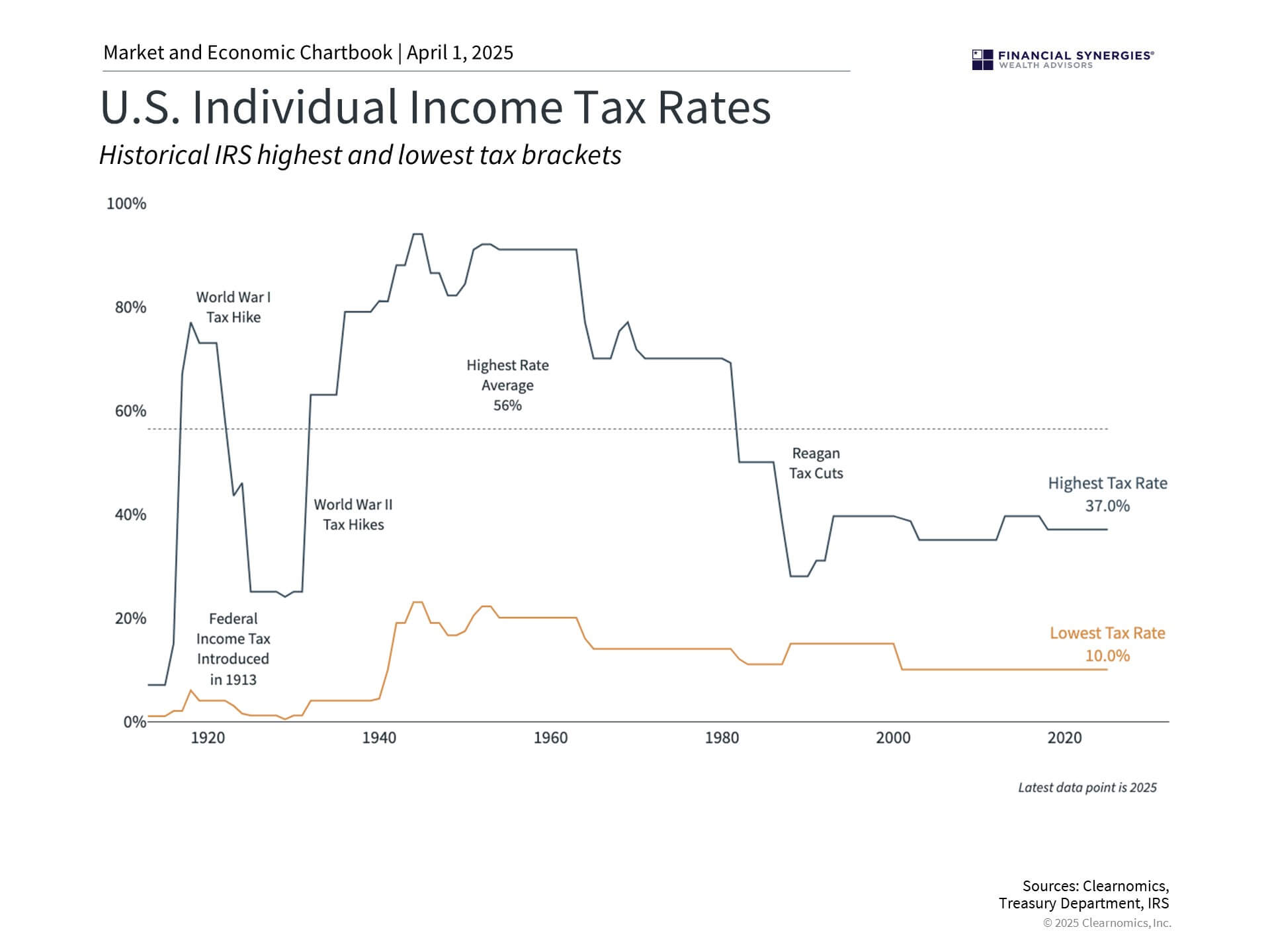- April 1, 2025
- Mike Minter

Albert Einstein reportedly once told his accountant, “the hardest thing in the world to understand is income taxes.” This observation from the Nobel Prize-winning physicist remains relevant today, as our tax system has only grown more complex in the decades since.
This year’s tax deadline on April 15 is approaching, but taxes are more than a once-a-year obligation – they are an essential part of year-round, holistic financial planning.
As with most aspects of financial success, preparation is key to tax planning and compliance. Keeping tax documents like W-2s, 1099s, charitable contribution receipts, and other forms organized can save time, help you to share them with your financial advisor and tax professional, and give you a springboard to assess tax optimization strategies.
For the same reason, it is critical to consider taxes as part of your overall financial planning to ensure you aren’t leaving money on the table. Taxes can be complex, so the importance of a proper tax strategy also can’t be overstated. However, not every strategy is right for everyone, so it’s also important to seek professional advice and consult your advisor.
To help provide perspective on the importance of tax strategies, here are five insights to think about this tax season and beyond.
1. Proactive Retirement Planning Should Always Consider Taxes
Effective tax management of retirement accounts should be viewed as a year-round strategic priority within your comprehensive financial plan, not just a tax season consideration. While retirement accounts offer significant tax advantages, maximizing these benefits is not the only consideration. Current income, expected income in the future, various life events, and aligning the timing of contributions versus other investments requires ongoing attention and planning over a lifetime. Whether you are early in your career, approaching, or already in retirement, there are tax considerations to be aware of.
Proactive tax planning helps optimize both retirement account contributions and withdrawals. For instance, should you maximize your 401(k) or contribute to an IRA instead? While IRA contributions can be made until the tax filing deadline, potentially reducing your previous year’s taxable income, 401(k) contributions must be completed by December 31st. Understanding these different deadlines and planning accordingly can help maximize tax advantages. If you are over 50, you also have additional opportunities through catch-up contributions.
Tax considerations become even more critical during retirement, particularly regarding Social Security and Required Minimum Distributions (RMDs). Rather than waiting until year-end, early planning for RMD obligations can help avoid costly penalties and create more efficient withdrawal strategies. Given recent regulatory changes to RMD rules, incorporating regular tax planning discussions with a trusted advisor has become increasingly important.
2. Make Use of Tax-Advantaged Strategies
Tools like Health Savings Accounts (HSAs), Roth conversions, and backdoor IRA strategies are key components of comprehensive tax planning.
- HSAs exemplify the power of proactive tax strategies, delivering a triple tax advantage that can be leveraged throughout the year: tax-deductible contributions, tax-free growth, and tax-free withdrawals for qualified medical expenses.
- Roth contributions can benefit those who expect their tax rate to be higher in retirement, providing tax diversification and tax-free access for beneficiaries.
- For certain individuals, Roth conversions can also be a long-term tax-saving strategy by effectively transferring traditional IRA assets to Roth accounts.
- Finally, a backdoor Roth IRA strategy remains an option for those whose income exceeds direct Roth IRA contribution limits, though proper execution is crucial to avoid tax complications.
Since each individual’s situation is different, you should always speak with your trusted advisor to tailor these strategies to your financial goals.
3. Plan for Your Legacy

Comprehensive wealth transfer planning has become an increasingly important pillar of financial planning, particularly given the evolving tax landscape under different political administrations. The current federal estate tax framework, which allows married couples to transfer up to $27.22 million tax-free and individuals up to $13.61 million, presents an opportunity for legacy planning. However, these thresholds highlight just one aspect of a broader wealth transfer strategy that deserves careful consideration.
Effective wealth transfer planning extends beyond simply understanding current tax thresholds. It requires a holistic approach that integrates estate planning, tax efficiency, and long-term family wealth preservation goals. It may even consider philanthropy and charitable goals. By taking a proactive stance on wealth transfer planning, families can potentially optimize their tax position while ensuring their legacy wishes are fulfilled.
A well-structured wealth transfer plan often incorporates various tools and techniques, from basic estate planning documents to more sophisticated trust arrangements. The complexity of these options, combined with varying state-level regulations and tax frameworks, makes professional guidance invaluable in developing and maintaining an effective strategy.
4. Investment Tax Implications
Just as investors often focus on capital gains management and tax-loss harvesting near the end of the year, the start of the new year can present opportunities as well. It’s important to consider both to maximize tax efficiency and maintain a well-balanced portfolio.
*We continually monitor our client portfolios for tax-loss harvesting opportunities.
For prior year liabilities, there are many factors to consider. For instance, the impact of equity compensation, alternative investments, or other investing strategies should be considered. One example is restricted stock units, also referred to as RSUs, which are generally not taxable until they vest. Once they vest, however, they are taxable even if they are not sold.
Mutual funds are similar with their annual distributions to shareholders counted as income at year end. Municipal bond investments, cryptocurrencies, real estate, collectibles, should all be reviewed for tax implications by a professional.
Next, it is prudent to take stock of financial needs for the current year. If there are any large expenses, charitable giving, or estate planning needs expected in the coming year, a review of the most tax efficient funding sources should be reviewed. This is also a good time to discuss diversification of a portfolio across asset classes, including optimizing your assets for tax efficiency, as well as considering industry exposure via small business ownership. In other words, it is never too early to prepare for the next tax year.
5. Prepare for Future Tax Obligation Uncertainty

The tax landscape continues to evolve. While President Trump’s return to office may mean that the Tax Cuts and Jobs Act will likely be extended, it’s important to remember that significant tax changes require Congressional approval. Longer-term, political views on taxes and spending can change over time as well. This uncertainty makes it crucial to maintain flexibility in tax planning and consider multiple scenarios when making long-term financial decisions.
Tax planning is an integral part of any financial plan and requires year-round attention. Integrating tax planning into your overall financial planning can help you achieve your financial goals. Please contact us if you would like to discuss ways to optimize your financial plan and tax strategy.
Concerns or questions about your financial plan or tax strategy? Contact Financial Synergies today.
We are a boutique, financial advisory and total wealth management firm with over 35 years helping clients navigate turbulent markets. To learn more about our approach to investment management please reach out to us. One of our seasoned advisors would be happy to help you build a custom financial plan to help ensure you accomplish your financial goals and objectives. Schedule a conversation with us today.
More relevant articles by Financial Synergies:
- 2024 Important Tax Numbers: A Handy Guide
- Important Resources for Filing Your 2023 Tax Return
- Top Client Questions: Fed, Debt, Trump
Blog Disclosures
This content, which may contain security-related opinions and/or information, is provided for informational purposes only and should not be relied upon in any manner as professional advice, or an endorsement of any practices, products or services. There can be no guarantees or assurances that the views expressed here will be applicable for any particular facts or circumstances, and should not be relied upon in any manner. You should consult your own financial advisors as to legal, business, tax, and other related matters concerning any investment.
The commentary in this “post” (including any related blogs, videos, and social media) reflects the personal opinions, viewpoints, and analyses of the Financial Synergies Wealth Advisors, Inc. employees providing such comments, and should not be regarded as the views of Financial Synergies Wealth Advisors, Inc. or its respective affiliates or as a description of advisory services provided by Financial Synergies Wealth Advisors, Inc. or performance returns of any Financial Synergies Wealth Advisors, Inc. client.
Any opinions expressed herein do not constitute or imply endorsement, sponsorship, or recommendation by Financial Synergies Wealth Advisors, Inc. or its employees. The views reflected in the commentary are subject to change at any time without notice.
Nothing on this website or Blog constitutes investment or financial planning advice, performance data or any recommendation that any particular security, portfolio of securities, transaction or investment strategy is suitable for any specific person. It also should not be construed as an offer soliciting the purchase or sale of any security mentioned. Nor should it be construed as an offer to provide investment advisory services by Financial Synergies Wealth Advisors, Inc.
Any mention of a particular security and related performance data is not a recommendation to buy or sell that security. Financial Synergies Wealth Advisors, Inc. manages its clients’ accounts using a variety of investment techniques and strategies, which are not necessarily discussed in the commentary. Investments in securities involve the risk of loss. Past performance is no guarantee of future results.
Any charts provided here or on any related Financial Synergies Wealth Advisors, Inc. personnel content outlets are for informational purposes only, and should also not be relied upon when making any investment decision. Any indices referenced for comparison are unmanaged and cannot be invested into directly. As always please remember investing involves risk and possible loss of principal capital; please seek advice from a licensed professional. Any projections, estimates, forecasts, targets, prospects and/or opinions expressed in these materials are subject to change without notice and may differ or be contrary to opinions expressed by others. Information in charts have been obtained from third-party sources and data, and may include those from portfolio securities of funds managed by Financial Synergies Wealth Advisors, Inc. While taken from sources believed to be reliable, Financial Synergies Wealth Advisors, Inc. has not independently verified such information and makes no representations about the enduring accuracy of the information or its appropriateness for a given situation. All content speaks only as of the date indicated.
Financial Synergies Wealth Advisors, Inc. is a registered investment adviser. Advisory services are only offered to clients or prospective clients where Financial Synergies Wealth Advisors, Inc. and its representatives are properly licensed or exempt from licensure. Investments in securities involve the risk of loss. Past performance is no guarantee of future results.



